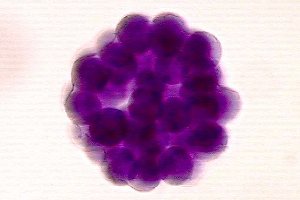As I talk about in a recent GeneWatch article, the same is true for the SERT gene and depression. This gene comes in two versions, long and short.
Studies have shown that people who only have the short version are at a higher risk for depression. A deeper look at the data shows that this is only the case if these people had a traumatic childhood. People with two short versions who had a happy childhood are actually more resistant to depression than people with the longer gene versions.
This all matters because we are at the point where you can choose some of your child’s gene versions. And too simplistic a view of genes could cause you to make the wrong choice.
People who undergo in vitro fertilization (IVF) can go through an additional procedure called preimplantation genetic diagnosis (PGD). Basically PGD allows you to look at an embryo’s DNA before it is placed in the womb. This means that when multiple embryos are created, you can choose which one to implant based on its genes.
Fortunately we can’t really change the embryo’s DNA for the foreseeable future so you’re stuck with whatever genes you and your partner can contribute. But as we are able to look at more and more genes with less and less DNA, we are getting very close to a Gattaca-like future where we can choose many of our children’s genes.
And as the two previous examples showed, this won’t be a simple choice! There are undoubtedly hundreds of genes just like these where what effect they have on someone depends on how and where that person lives, how they were raised, etc. It might be best to restrict this sort of thing except for cases where the child might end up with a devastating illness like cystic fibrosis or sickle cell anemia.
In some ways, this sort of thing is already being restricted. For example, when a fertility doctor in L.A. suggested that he might offer parents a chance to choose what eye, hair, and skin color their children might have, the public uproar shut down the service before it even began.
I’m not sure that less politically sensitive gene selection would cause such a furor. It may be that we need some sort of government regulation to protect people from what they don’t know. Or maybe parents need to take a course before selecting which embryo they want…
37.7749295 -122.4194155
 When choosing an embryo, a little bit of knowledge is a dangerous thing.
When choosing an embryo, a little bit of knowledge is a dangerous thing.